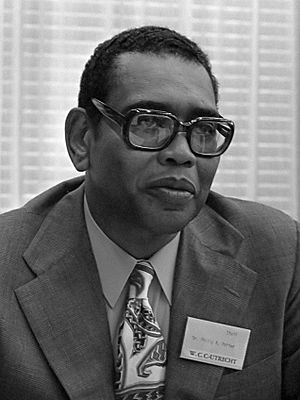Philip Potter (church leader) facts for kids
Philip Alford Potter (born August 19, 1921 – died March 31, 2015) was an important leader in the Methodist Church. He also served as the third top leader, called the General Secretary, of the World Council of Churches from 1972 to 1984. This organization helps different Christian churches work together.
Philip Potter's Early Life and Work
Philip Potter was born in Roseau, Dominica, which is an island in the Caribbean. His family was Christian. His mother was Protestant, and his father was Catholic.
From a young age, Philip was very involved in church activities. He later became a pastor, which is a church minister. He worked in Nevis and with people who spoke Creole in rural Haiti. He also worked for the Methodist Missionary Society in London.
In 1947, he represented the Jamaica Student Christian Movement at a big Christian youth conference in Oslo, Norway. He also spoke for young people at the first two meetings of the World Council of Churches (WCC) in Amsterdam (1948) and Evanston (1954). Later, in 1984, he received a special degree from Uppsala University in Sweden.
Leading the World Council of Churches
In 1954, Philip Potter moved to Geneva to work in the WCC's youth department. He stayed with the WCC until he retired. He was the leader of the World Student Christian Federation from 1960 to 1968.
From 1972 to 1984, he was the General Secretary of the WCC. This means he was in charge of running the organization. He is known as a key leader in ecumenism, which is the movement to bring different Christian churches closer together.
In 2006, Samuel Kobia, who was then the General Secretary of the WCC, spoke about Philip Potter's work. He said that under Philip Potter's leadership, the WCC made great progress. Some important things they did included:
- Creating a document called Baptism, Eucharist and Ministry, which helped churches agree on these important practices.
- Continuing a brave fight against apartheid (a system of racial segregation) in southern Africa and other forms of racism around the world.
- Discussing how Christian missions should work after colonial times.
- Working together for peace during times of tension between East and West, and against the threat of nuclear war.
- Exploring new ways of spirituality, worship, and music from different church traditions.
In November 2009, the World Student Christian Federation (WSCF) started the Philip Potter Fund. This fund helps train young people to become ecumenical leaders. Also, the WCC renamed its library "The Philip Potter Library" to honor him.
Philip Potter's Family Life
Philip Potter's first wife, Doreen, passed away from cancer in 1980. She was the daughter of a Methodist minister from Jamaica. In 1985, Philip married Bärbel Wartenberg. She later became a Bishop in Lübeck, Germany, from 2001 to 2008. Philip Potter died on March 31, 2015, in Lübeck, Germany.


